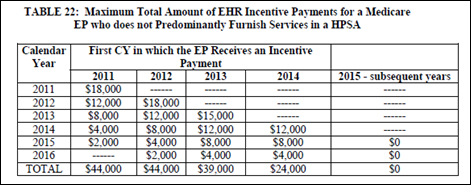Re: Walmart Health: Just had a great dental visit this morning, which was preceded by helpful reminders from Epic, and…
News 1/05/10
From H&R Block: “Re: meaningful use. Heard a peer say the following about ARRA: ‘I didn’t decide to have kids because there was a tax break. I’ll take the one they give, but its not the reason to have kids.’” I’ll say this for the tax code: you don’t need to hire an accountant to help you figure out if you have dependents. On the other hand, after a few hours trying to weed through several hundred pages of the meaningful use guidelines, I’m buying stock in consulting companies. But to H&R Block’s point, I’m not sure how many physicians are going to move to an EMR solely to get some cash from the government. The average physician or office manager will need assistance figuring out the requirements. Even using the most sophisticated software, the requirements are no slam dunk and the upfront costs remain high. If I were a vendor, I would get busy developing an alternate talk-track that encourages EMR adoption for reasons other than just qualifying for ARRA dollars.
If only it were this easy. EMR vendor Waiting Room Solutions announces that Ohio Pain Center selects its EMR/PM solution, which it claims “will qualify” the practice “to collect PQRI and ARRA EMR Stimulus incentive monies.” I hope someone has told the clinic to check out CCHIT’s website that says Waiting Room Solutions product “has not been tested against the applicable proposed Federal standards in existence on the date of certification for certified EHR technology of its type under the American Recovery and Reinvestment Act of 2009 (ARRA).” Then, perhaps the doctor might want to read through the meaningful use guidelines.
By the way, the latest proposed rules defer the final definition of “certified EHR technology” until ONC’s upcoming interim final rule. The recommendations do indicate that a “certified EHR technology” is a qualified EHR certified as meeting standards defined by the Secretary. Included are a couple of examples of technology that would NOT meet the definition of a certified technology, including a “complete EHR” that hasn’t been “tested and certified in accordance with the certification program established by the National Coordinator, even though it may be claimed that such technology provides the same capabilities as those required by adopted certification criteria.” The key here is we still don’t have a definitive answer as to which “certification programs” (or certifying bodies) are valid. We have to assume CCHIT certification is valid, since it’s really the only player today, but it does leave the door open for other options. My prediction is that if a product is not CCHIT-certified (probably at least a 2008 level or higher) then it will be tough to qualify for funds.
Last week, Mr. H provided a great overall summary of the ONCHIT preliminary meaningful use definitions (the Excel version is here), and followed up with some overall impressions a couple days later. Much of the 700 pages is redundant, but here are a few additional nuggets of information that focus particularly on eligible professionals (EPs).
Timing of incentive payments
Payment timing varies depending on the EHR incentive program in which the EP is participating (Medicare FFS or Medicaid) or if it is a hospital. Under the Medicare plan, first-year payment qualification requires the EP to meaningfully use an EHR for any continuous 90 days within the payment year. In subsequent years, meaningful use is required for the full payment year. The final dates related to payment timing are not yet defined, but the earliest possible 90-day period could begin July 1, 2010, which is 90 days before the start of the government’s FY 2011 (October 1, 2010). The latest possible date to start the 90-day period and qualify for 2011 payment would be October 1, 2011, which is 90 days before CY 2011. The committee’s recommendation is to set October 1, 2010 as the start date for the initial EHR reporting period, which means qualification (and payment) could come as early as January 1, 2011.
Amount of incentive payments
This chart isn’t new, but it does reiterate the need for an EP to reach meaningful use during 2012 if he/she wants to earn the most incentive dollars. Using the proposed timetable listed above, EPs must start the 90-day period proving Stage 1 meaningful use no later than October 1, 2012.
EPs can opt to be in the Medicaid incentive program, which pays a maximum of $63,750, if at least 30% of his/her patient volume is Medicaid. EPs have the option to make a one-time switch between programs (though the total incentive amount cannot exceed the Medicaid cap). One of the nice things about the Medicaid program (aside that it offers more money) is that you can wait until 2016 to start the certification process and still receive the maximum $63,750.
How to get the money
It’s unlikely HHS will be ready to electronically accept data on clinical quality measures for the 2011 payment year (ironically). Thus, EPs will likely be required to “attest” to its meaningful use of an EHR in order to qualify for funds. By 2012, an EP will electronically submit the summary information on the selected quality measures. Look for compliance reviews to validate provider eligibility and meaningful use assertions.
Assigning money to an employer or other entity
EPs can reassign incentive payments to an employer or entity with which the physician has a valid employment arrangement, though an EP can’t assign payment to more than one employer or entity. Not addressed (that I noticed) was if an EP could assign a portion of the incentive money to a hospital that was not his/her employer. That might be something attractive for hospitals interested in subsidizing upfront EHR costs via Stark legislation.
The MGMA says that the proposed EHR incentive program rules are too complex and that medical groups will confront significant challenges to meet the program requirements. “Overly burdensome requirements and needlessly complex administration will only discourage physician participation in the program and implementation of EHRs,” says MGMA president and CEO William F. Jesse, MD. Meanwhile, HIMSS releases a statement saying the proposals offer more that should be applauded than criticized, and provides clarity of what technology functions constitute a qualified electronic health record. I think I am with Jesse on this one.
Nuance Communications releases the results of a 1,000-physician survey about the incentive plan. Apparently the majority of providers think there’s too much emphasis on data capture and quantitative measures rather than the capture of qualitative information that tells each patient’s unique health history (keep in mind that Nuance sells voice dictation products like Dragon Naturally Speaking). Less than 10% of the physicians said they were confident / very confident that the government’s current HIT measures would result in higher quality patient health records.
More negative opinions from physicians on EMR: the 2009 Physician Pulse Report concludes that physicians are increasingly dissatisfied with EMRs, which they find time-consuming and possibly compromising patient safety.
athenahealth signs a deal with Caritas Christi Health Care to provide EHR for its 500 employed providers. Caritas, which already uses athenahealth’s RCM service, will also offer athenaclinicals to 1,200 affiliated providers.
Happy New Year, by the way!




